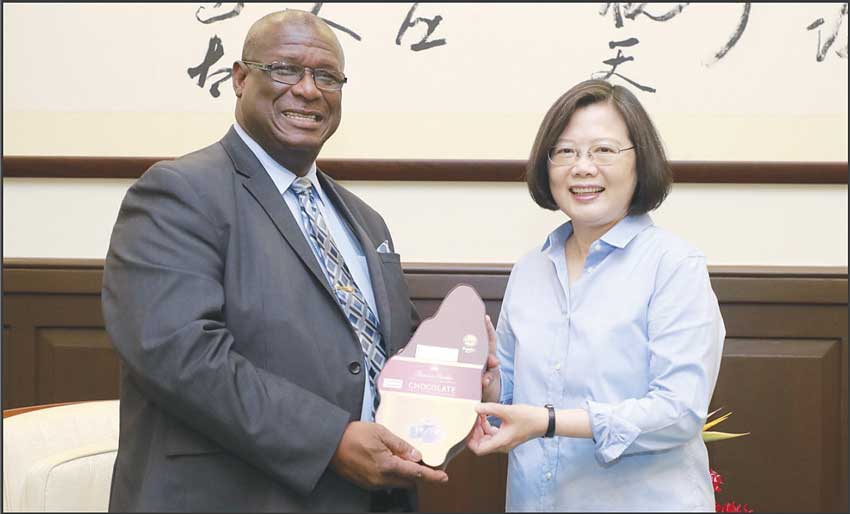Earl@Large
Saint Lucia-born Caribbean journalist Earl Bousquet was among eight writers from African, Caribbean and Pacific (ACP) countries invited to Taiwan for a familiarity tour that coincided with the 2nd anniversary of the advent of the administration of President Tsai Ing-wen, installed on May 20, 2016 after her Democratic People’s Party (DPP) defeated the Chinese Nationalist Party KMT (Kuomintang) four months earlier on January 16. This is the third in a series of reports on Bousquet’s third visit to Taiwan.
FORMER Prime Minister Stephenson King’s May visit to Taiwan was interesting.
Eleven years earlier, he’d refused to join the palace coup that led to Saint Lucia breaking ties with China to re-engage with Taiwan. Now he was in Taiwan to represent Saint Lucia at the official observance of the inauguration of President Tsai Ing-wen, following her Democratic People’s Party (DPP) victory in the January 16, 2016 presidential and parliamentary elections.
Madam Tsai had pledged throughout the campaign to de-emphasize ties with Beijing — and started doing just that after taking office four months later on May 20.
Two years later, ties with Mainland China have moved from oven-hot (under previous Chinese Nationalist Party (KMT) President Ma Ying-jieu) to ice-cold (under Tsai).
China continues to be Taiwan’s major trading partner and tourism is still very much alive across the Strait that divides the island and the mainland. But Cross Strait ties are at an all-time low today, compared to four years ago when air and sea traffic were both sky-high.
Beijing has been tightening the screws on Taipei ever since Tsai and the DPP administration concretized their determination not to recognize the 1992 Consensus, a 26-year-old accord between the two sides that each has selectively interpreted.
Under Ma, China did not oppose Taiwan’s attendance at meetings of the World Health Organization (WHO) or the International Civil Aviation Organization (ICAO), or its participation in the Olympic Games. But not so under Tsai, as Beijing-Taipei ties are not as warm and strong.
Where Beijing had loosened the screws under Ma for two consecutive terms (2008 to 2016), they were again tightened, especially after Tsai started engaging incoming US President, Donald Trump.
As President-elect, Trump rattled the feathers in US-China ties by taking a phone call from Tsai and making pro-Taiwan pronouncements that raised alarm bells in Beijing.

While King was in Taipei, Taiwan was complaining of being shut out of the WHO’s 71st World Health Assembly in Geneva.
Saint Lucia was among the 15 states – Taiwan’s diplomatic allies — supporting Taiwan’s attendance. But never mind support also from the likes of Canada, Germany and Japan, the WHO remained unmoved.
Taipei was also complaining that Beijing was playing a name game at its expense. Like it does in all international spaces Taiwan seeks to occupy, Beijing insisted that international airlines flying to China refer to Taiwan as part of China.
Minister King met President Tsai and they exchanged the normal diplomatic pleasantries, reviewed and previewed bilateral ties, examined challenges and explored opportunities. But beneath it all was the underlying factor of Beijing’s unrelenting fast-track application of tit-for-tat non-cooperation with Taipei.
In two years, Taiwan has lost several of its diplomatic allies to China: Sao Tome and Principe in December 2016, Panama in 2017 and the Dominican Republic on April 30, 2018. Then, on May 24th, Burkina Faso became the second ally in one month — and the fifth in two years — to break ties.
Taipei accuses Beijing of using ‘Checkbook Diplomacy’ to influence its allies to break ties. But KMT and media critics are accusing the Tsai administration of doing the same, pointing to sizeable ‘Strategic Loans’ being given to allies whose diplomatic loyalty Taipei may have reason to be uncertain about.
The Solomon Islands received one such loan disbursement to construct a stadium to host a major Pacific sporting event; and Saint Lucia received a similar $150 million aid package in 2017.
But the Taiwanese continue to be concerned, if not worried, about hardly veiled efforts to woo Saint Lucia to China.
Taipei is understandably worried that its list of allies is dwindling too fast and will naturally do all it can to keep what’s left, Saint Lucia included.
But when it comes to maintaining ties with its remaining allies, Madam Tsai’s hands are (sort of) tied.
On the one hand, she insists Taiwan is not about to enter into a tit-for-tat bidding war with China, but on the other, she also maintains her administration “will never bow under pressure” from Beijing.
Clearly, as things stand now, Taiwan and China are not about to play ball, far less to read from the same hymn sheet. The two are definitely not about to Tango.
But something will have to give – and it’s not just about which side will be the first to blink, as a solution, or lack thereof, has continuing implications for millions of Chinese on both sides of the Strait.
Indeed, Beijing having longer hands and deeper pockets, there are those in Taipei who feel that unless the leading lady and ruling party change tact, their next two years can only see more of the same.













